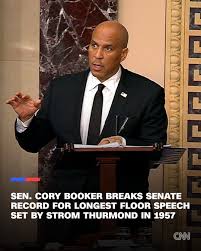Cory Booker breaks Strom Thurmond’s filibuster record with a speech lasting over 24 hours, surpassing the 1957 Civil Rights Act filibuster.

In the annals of American political history, few moments stand as clearly and decisively as the filibuster—a tactic that has been employed in various forms to delay, block, or amend legislation. Throughout the years, the filibuster has evolved, often becoming a symbol of resistance or even defiance in the face of powerful political forces. The most famous and longest filibuster in American history has belonged to Strom Thurmond, a South Carolina Senator who stood for a record 24 hours and 18 minutes in 1957 to oppose the Civil Rights Act of that year. That record, however, was broken by a new generation of politicians in a stunning display of endurance and commitment to a cause.
Cory Booker, a Democratic Senator from New Jersey, shattered this long-standing filibuster record in an extraordinary, almost unprecedented, feat of political speechcraft. The filibuster lasted for over 24 hours, stretching into a marathon speech that began at 7 p.m. ET on Monday and continued well into the early hours of Tuesday, breaking Thurmond’s record by the 7:18 p.m. mark on Tuesday. This remarkable feat not only drew widespread attention from the public and media but also provided a platform for Booker to advocate for critical issues facing the American people. His unyielding persistence solidified his place in political history and set the stage for a new chapter in American legislative battles.
The Context of the Filibuster: A Historical Framework
Filibusters have long been a part of American political discourse, and they are often employed as a tool of minority parties seeking to prevent a vote on a particular piece of legislation. Traditionally, the Senate has allowed lawmakers to filibuster a bill indefinitely unless a supermajority of 60 senators votes to invoke cloture, effectively ending the filibuster and allowing for a vote. Over time, filibusters have become associated with moments of profound political struggle, and they often represent the clash between ideologies, with one side refusing to allow the legislative process to move forward.
The filibuster that Thurmond conducted in 1957, which lasted for 24 hours and 18 minutes, was an effort to block the Civil Rights Act, which sought to address the racial injustices and inequalities that were widespread in the United States at the time. Thurmond’s speech was a reflection of the deeply entrenched racial divisions that existed in the country, and it came at a time when the Civil Rights Movement was gaining momentum across the nation. Thurmond’s filibuster was ultimately unsuccessful, as the bill was passed, but it remains a symbol of the lengths to which some lawmakers were willing to go in order to preserve the status quo of segregation and discrimination.
By breaking Thurmond’s record, Booker was stepping into a long legacy of political resistance. However, his reasons for undertaking this modern filibuster were starkly different from Thurmond’s. While Thurmond’s filibuster was driven by an effort to protect institutionalized racial segregation, Booker’s filibuster was aimed at promoting progress, equality, and justice for all Americans. It was not just a symbolic act; it was a commitment to drawing attention to specific political and social issues, while signaling the importance of fighting for the rights and dignity of marginalized communities.
Booker’s Speech: The Themes and Issues at Hand
Booker’s filibuster was driven by several critical issues that have taken center stage in contemporary American politics, including police reform, racial justice, income inequality, and access to healthcare. While the filibuster was a spectacle of endurance, it was also a carefully planned and deeply meaningful political statement. Booker used his extended platform to not only advocate for the causes that have defined his career but also to call for a renewed sense of political commitment to those most in need.
One of the key topics that Booker addressed during the filibuster was police reform. Booker has been an outspoken advocate for efforts to address systemic racism in law enforcement, particularly in the wake of the killings of unarmed Black individuals by police officers. His filibuster served as an urgent call to action, urging lawmakers to pass meaningful legislation that would hold law enforcement accountable for abuses of power, ensure transparency, and promote equality in policing practices. Booker has long championed the use of body cameras for police officers, the creation of independent oversight committees, and the elimination of discriminatory policing practices like stop-and-frisk. During his speech, he spoke passionately about the need for systemic reforms to ensure that Black and Brown communities are treated with dignity and respect.
Another key issue that Booker focused on during his filibuster was the growing disparity in wealth and income in America. With rising economic inequality, Booker emphasized the importance of addressing the root causes of poverty and ensuring that all Americans, regardless of their background, have access to the resources they need to thrive. He argued that without meaningful economic reforms, the United States would continue to face widening disparities that could further destabilize society and undermine the democratic values on which the nation was founded.
Booker also used the filibuster to champion healthcare reform, arguing for greater access to affordable healthcare for all Americans. Drawing from his own experiences as a former mayor of Newark, New Jersey, where he worked closely with communities to address public health disparities, Booker spoke about the need for policies that ensure everyone has the right to quality healthcare, particularly marginalized communities that are often left out of the system. He advocated for expanding access to healthcare, lowering prescription drug prices, and improving mental health services, all of which are critical to ensuring a healthy and equitable society.
Additionally, Booker emphasized the importance of voting rights. Throughout his career, he has been a staunch advocate for protecting the rights of every American to vote. He spoke out against voter suppression efforts that disproportionately affect communities of color and low-income voters. In his filibuster, Booker called for stronger federal protections to ensure that every citizen, regardless of their race, ethnicity, or economic status, has an equal say in the political process. He warned that any attempt to curtail voting rights would undermine the very foundation of democracy in America.
The Political and Public Reaction
The response to Booker’s record-breaking filibuster was immediate and widespread. Social media exploded with reactions from politicians, journalists, activists, and ordinary citizens. While many praised Booker for his tenacity and his commitment to fighting for justice and equality, others criticized the filibuster as a stunt or a distraction from the real work that needed to be done in Congress. Yet, regardless of the criticisms, it was clear that Booker had succeeded in drawing attention to critical issues facing the nation.
In particular, Booker’s filibuster highlighted the divide between the progressive wing of the Democratic Party and more moderate or conservative factions. While many Democrats and progressives hailed Booker’s speech as a symbol of hope and resilience, others pointed out that such acts of political theater often come at the cost of meaningful progress. It is not uncommon for the Senate to see extended filibusters on high-profile issues, but many see such tactics as ineffective in achieving long-term change. Critics argued that the real focus should be on pushing forward tangible policy reforms and working across party lines to achieve results.
Nonetheless, Booker’s filibuster was an opportunity for him to demonstrate his unwavering commitment to the causes he cares about. It was a reminder to the American people that progress is not always linear, and sometimes, it requires an unrelenting voice to bring about real change. Booker’s message was clear: The fight for justice, equality, and opportunity is far from over, and it requires all of us to stay engaged, to speak out, and to continue pushing for a more just society.
A New Legacy for the Filibuster
Cory Booker’s record-breaking filibuster represents a new chapter in the legacy of the filibuster, one that is rooted in the ideals of justice and equality rather than obstructionism and resistance to progress. Unlike the infamous filibuster of Strom Thurmond, which sought to preserve the status quo of racial segregation, Booker’s filibuster was a call to action for lawmakers to pass legislation that would bring the country closer to its ideals of equality, fairness, and democracy.
Through his speech, Booker proved that the filibuster, while historically a tool of opposition, can be transformed into a vehicle for positive change. By using this unique form of protest, Booker was able to elevate the conversation around crucial issues that have too often been relegated to the sidelines of national discourse. His filibuster was a reminder that even in the face of political gridlock, there are still opportunities to make an impact, to raise awareness, and to advocate for the values that truly matter.
In the end, Booker’s filibuster was not just about breaking a record—it was about creating a lasting legacy of commitment to social justice. As the hours stretched into days, Booker’s speech became a powerful testament to the importance of standing up for what’s right, no matter the cost. It was a moment of political endurance and courage that will be remembered as a pivotal moment in the ongoing struggle for a more just and equitable America.









